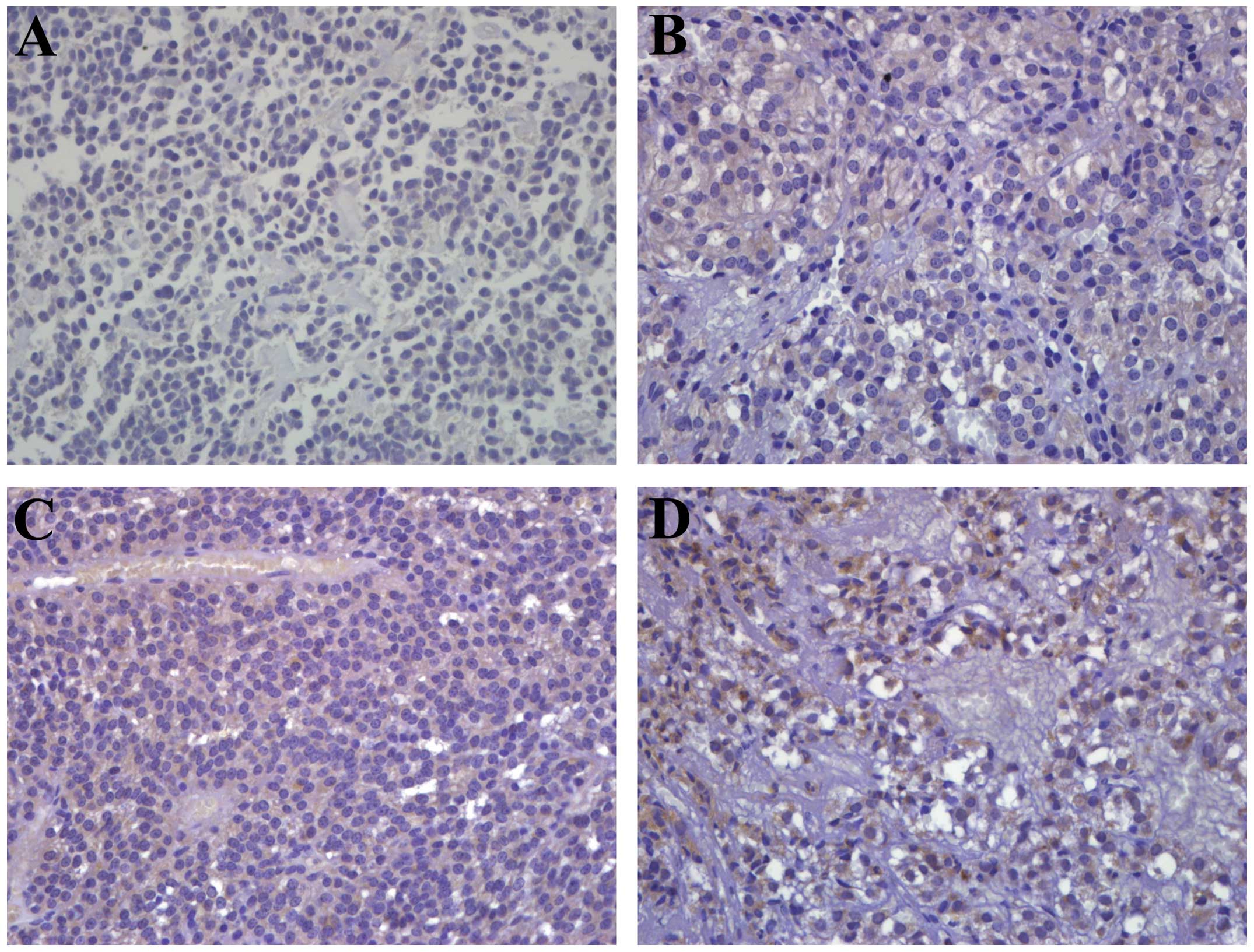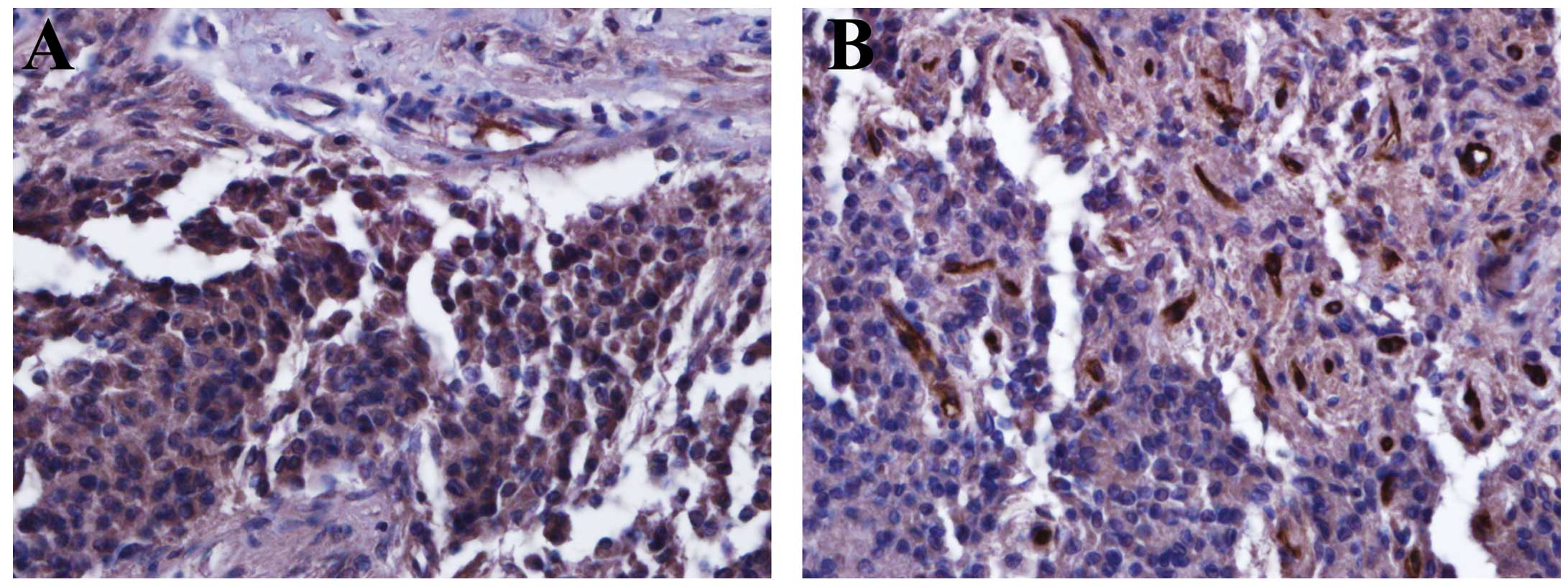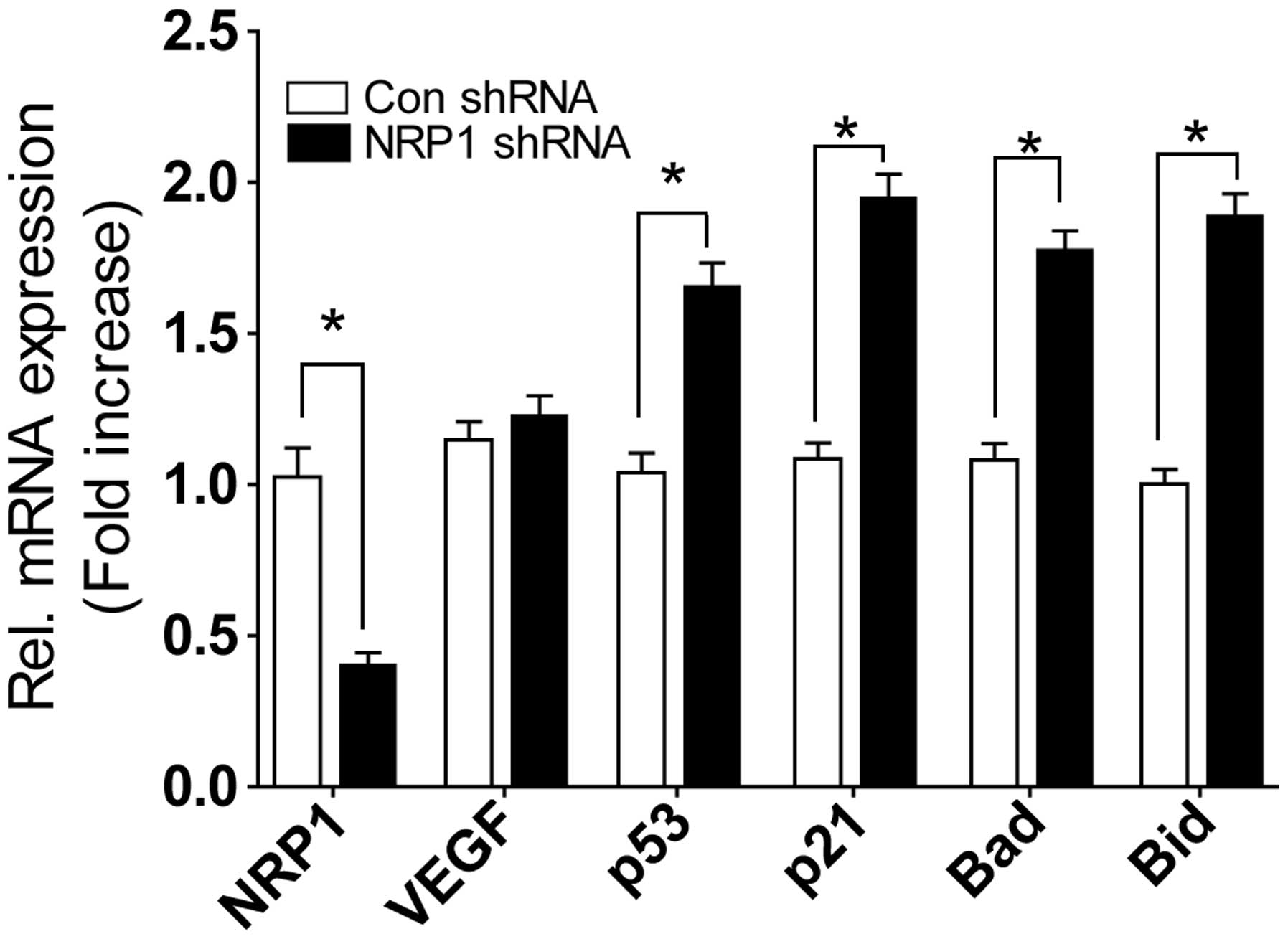|
1
|
Ezzat S, Asa SL, Couldwell WT, et al: The
prevalence of pituitary adenomas: a systematic review. Cancer.
101:613–619. 2004. View Article : Google Scholar : PubMed/NCBI
|
|
2
|
Hsu DW, Hakim F, Biller BM, et al:
Significance of proliferating cell nuclear antigen index in
predicting pituitary adenoma recurrence. J Neurosurg. 78:753–761.
1993. View Article : Google Scholar : PubMed/NCBI
|
|
3
|
Gejman R, Swearingen B and Hedley-Whyte
ET: Role of Ki-67 proliferation index and p53 expression in
predicting progression of pituitary adenomas. Hum Pathol.
39:758–766. 2008. View Article : Google Scholar : PubMed/NCBI
|
|
4
|
Lloyd RV: Pituitary tumors. World Health
Organization Classification of Tumors, Pathology and Genetics of
Tumors of Endocrine Organs. DeLellis A: IARC Press; Lyon: pp.
10–13. 2004
|
|
5
|
Hentschel SJ, McCutcheon lE, Moore W and
Durity FA: P53 and MIB-1 immunohistochemistry as predictors of the
clinical behavior of nonfunctioning pituitary adenomas. Can J
Neurol Sci. 30:215–219. 2003. View Article : Google Scholar : PubMed/NCBI
|
|
6
|
Sambaziotis D, Kapranos N and Kontogeorgos
G: Correlation of bcl-2 and bax with apoptosis in human pituitary
adenomas. Pituitary. 6:127–133. 2003. View Article : Google Scholar : PubMed/NCBI
|
|
7
|
Iuchi T, Saeki N, Osato K and Yamaura A:
Proliferation, vascular endothelial growth factor expression and
cavernous sinus invasion in growth hormone secreting pituitary
adenomas. Acta Neurochir. 142:1345–1351. 2000. View Article : Google Scholar
|
|
8
|
Cohen AB and Lessell S: Angiogenesis and
pituitary tumors. Semin Ophthalmol. 24:185–189. 2009. View Article : Google Scholar : PubMed/NCBI
|
|
9
|
Tammela T, Enholm B, Alitalo K and
Paavonen K: The biology of vascular endothelial growth factors.
Cardiovasc Res. 65:550–563. 2005. View Article : Google Scholar : PubMed/NCBI
|
|
10
|
Oh H, Takagi H, Otani A, et al: Selective
induction of neuropilin-1 by vascular endothelial growth factor
(VEGF): a mechanism contributing to VEGF-induced angiogenesis. Proc
Natl Acad Sci USA. 99:383–388. 2002. View Article : Google Scholar : PubMed/NCBI
|
|
11
|
Benveniste RJ, King WA, Walsh J, et al:
Repeated transsphenoidal surgery to treat recurrent or residual
pituitary adenoma. J Neurosurg. 102:1004–1012. 2005. View Article : Google Scholar : PubMed/NCBI
|
|
12
|
Lee JS, Yoon A, Kalapurakal SK, et al:
Expression of p53 oncoprotein in non-small-cell lung cancer: a
favorable prognostic factor. J Clin Oncol. 13:1893–1903.
1995.PubMed/NCBI
|
|
13
|
Thunnissen FB, Schuurbiers OC and den
Bakker MA: A critical appraisal of prognostic and predictive
factors for common lung cancers. Histopathology. 48:779–786. 2006.
View Article : Google Scholar : PubMed/NCBI
|
|
14
|
Bielenberg DR, Pettaway CA, Takashima S
and Klagsbrun M: Neuropilins in neoplasms: expression, regulation,
and function. Exp Cell Res. 312:584–593. 2006. View Article : Google Scholar : PubMed/NCBI
|
|
15
|
Guttmann-Raviv N, Kessler O, Shraga-Heled
N, et al: The neuropilins and their role in tumorigenesis and tumor
progression. Cancer Lett. 231:1–11. 2006. View Article : Google Scholar : PubMed/NCBI
|
|
16
|
Turner HE, Nagy Z, Gatter KC, et al:
Angiogenesis in pituitary adenomas and the normal pituitary gland.
J Clin Endocrinol Metab. 85:1159–1162. 2000. View Article : Google Scholar : PubMed/NCBI
|
|
17
|
Di Ieva A, Grizzi F, Ceva-Grimaldi G, et
al: Fractal dimension as a quantitator of the microvasculature of
normal and adenomatous pituitary tissue. J Anat. 211:673–680.
2007.PubMed/NCBI
|
|
18
|
Takada K, Yamada S and Teramoto A:
Correlation between tumor vascularity and clinical findings in
patients with pituitary adenomas. Endocr Pathol. 15:131–139. 2004.
View Article : Google Scholar : PubMed/NCBI
|
|
19
|
Fukui S, Nawashiro H, Otani N, et al:
Vascular endothelial growth factor expression in pituitary
adenomas. Acta Neurochir Suppl. 86:519–521. 2003.PubMed/NCBI
|
|
20
|
Fukui S, Otani N, Nawashiro H, et al: The
association of the expression of vascular endothelial growth factor
with the cystic component and haemorrhage in pituitary adenoma. J
Clin Neurosci. 10:320–324. 2003. View Article : Google Scholar : PubMed/NCBI
|
|
21
|
Sánchez-Ortiga R, Sánchez-Tejada L,
Moreno-Perez O, et al: Over-expression of vascular endothelial
growth factor in pituitary adenomas is associated with extrasellar
growth and recurrence. Pituitary. 16:370–377. 2013.PubMed/NCBI
|
|
22
|
Onofri C, Theodoropoulou M, Losa M, et al:
Localization of vascular endothelial growth factor (VEGF) receptors
in normal and adenomatous pituitaries: detection of a
non-endothelial function of VEGF in pituitary tumours. J
Endocrinol. 191:249–261. 2006. View Article : Google Scholar
|
|
23
|
Cristina C, Perez-Millan MI, Luque G, et
al: VEGF and CD31 association in pituitary adenomas. Endocr Pathol.
21:154–160. 2010. View Article : Google Scholar : PubMed/NCBI
|
|
24
|
Nör JE, Christensen J, Mooney DJ and
Polverini PJ: Vascular endothelial growth factor (VEGF)-mediated
angiogenesis is associated with enhanced endothelial cell survival
and induction of Bcl-2 expression. Am J Pathol. 154:375–384.
1999.PubMed/NCBI
|
|
25
|
Turner HE, Nagy Z, Gatter KC, Esiri MM, et
al: Proliferation, bcl-2 expression and angiogenesis in pituitary
adenomas: relationship to tumour behaviour. Br J Cancer.
82:1441–1445. 2000. View Article : Google Scholar : PubMed/NCBI
|
|
26
|
Pan Q, Chanthery Y, Liang WC, et al:
Blocking neuropilin-1 function has an additive effect with
anti-VEGF to inhibit tumor growth. Cancer Cell. 11:53–67. 2007.
View Article : Google Scholar : PubMed/NCBI
|
|
27
|
Banerjee SK, Zoubine MN, Tran TM, et al:
Overexpression of vascular endothelial growth factor164 and its
co-receptor neuropilin-1 in estrogen-induced rat pituitary tumors
and GH3 rat pituitary tumor cells. Int J Oncol. 16:253–260.
2000.PubMed/NCBI
|
|
28
|
Pan Q, Chathery Y, Wu Y, et al:
Neuropilin-1 binds to VEGF121 and regulates endothelial cell
migration and sprouting. J Biol Chem. 282:24049–24056. 2007.
View Article : Google Scholar : PubMed/NCBI
|
|
29
|
Fu L, Kitamura T, Iwabuchi K, Ichinose S,
et al: Interplay of neuropilin-1 and semaphorin 3A after partial
hepatectomy in rats. World J Gastroenterol. 18:5034–5041. 2012.
View Article : Google Scholar : PubMed/NCBI
|
|
30
|
Matthies AM, Low QE, Lingen MW and
DiPietro LA: Neuropilin-1 participates in wound angiogenesis. Am J
Pathol. 160:289–296. 2002. View Article : Google Scholar : PubMed/NCBI
|
|
31
|
Brusselmans K, Bono F, Collen D, et al: A
novel role for vascular endothelial growth factor as an autocrine
survival factor for embryonic stem cells during hypoxia. J Biol
Chem. 280:3493–3499. 2005. View Article : Google Scholar : PubMed/NCBI
|
|
32
|
Korsisaari N, Ross J, Wu X, et al:
Blocking vascular endothelial growth factor-A inhibits the growth
of pituitary adenomas and lowers serum prolactin level in a mouse
model of multiple endocrine neoplasia type 1. Clin Cancer Res.
14:249–258. 2008. View Article : Google Scholar
|
|
33
|
Ortiz LD, Syro LV, Scheithauer BW, et al:
Anti-VEGF therapy in pituitary carcinoma. Pituitary. 15:445–449.
2012. View Article : Google Scholar : PubMed/NCBI
|
|
34
|
Jubb AM, Strickland LA, Liu SD, et al:
Neuropilin-1 expression in cancer and development. J Pathol.
226:50–60. 2012. View Article : Google Scholar : PubMed/NCBI
|

















